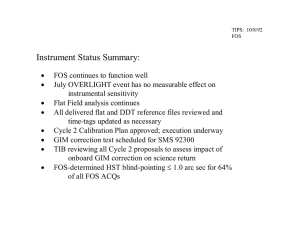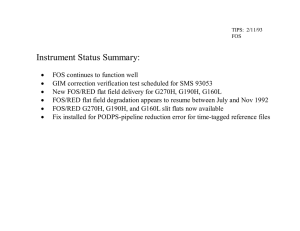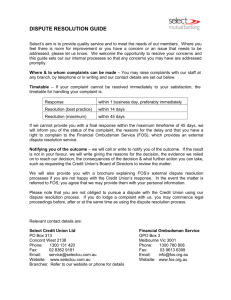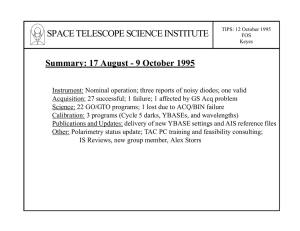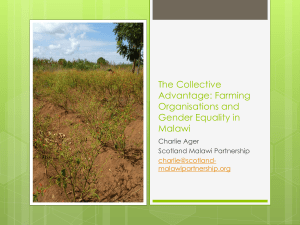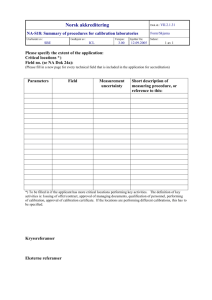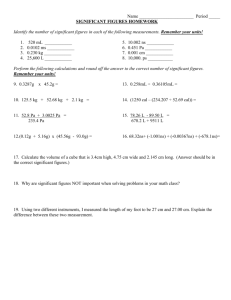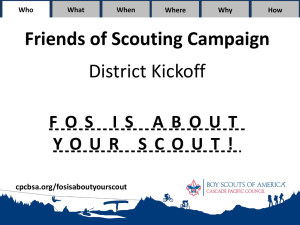SPACE TELESCOPE SCIENCE INSTITUTE Summary: 10 October - 29 November 1995
advertisement
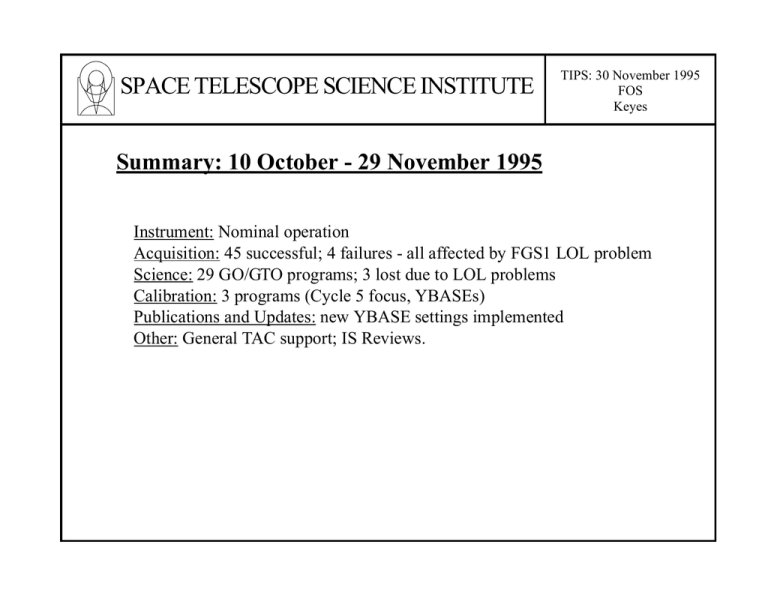
SPACE TELESCOPE SCIENCE INSTITUTE TIPS: 30 November 1995 FOS Keyes Summary: 10 October - 29 November 1995 Instrument: Nominal operation Acquisition: 45 successful; 4 failures - all affected by FGS1 LOL problem Science: 29 GO/GTO programs; 3 lost due to LOL problems Calibration: 3 programs (Cycle 5 focus, YBASEs) Publications and Updates: new YBASE settings implemented Other: General TAC support; IS Reviews. SPACE TELESCOPE SCIENCE INSTITUTE TIPS: 30 November 1995 FOS Keyes Instrument Status (10 October - 29 November 1995): FOS instrumental operation nominal Target Acquisitions: - two failed due to FGS1 loss-of-lock during ACQ/PEAK slews - GHRS science proceeded for one of these instances; the other was lost - two failed due to loss-of-lock during or associated with offset slews - FOS science partially lost for one; entirely lost for other. SPACE TELESCOPE SCIENCE INSTITUTE Other: General TAC support. . TIPS: 30 November 1995 FOS Keyes SPACE TELESCOPE SCIENCE INSTITUTE TIPS: 30 November 1995 FOS Keyes Cycle 4 Calibration Plan Summary Program Location of Spectra Dark Monitoring Aperture Wheel Repeatability Focus, X-pitch, Y-pitch Responsible Publication Status Koratkar, Dahlem CAL/FOS-133 PDB updates closed Hayes CAL/FOS-146 (draft) pending closure Dahlem CAL/FOS-131 closed Koratkar, Martin closed - no changes Discriminator Test Wheeler closed - no changes FOS/BL GIM characterization Dahlem open Polarimetry Wavelength Calibration Flat Fields Photometric Monitor, Aperture Throughputs Allen CDBS updates open Dahlem HST Workshop pending closure Keyes CAL/FOS-143 (draft) HST Workshop pending closure Bohlin, Lindler, Keyes, Colina CAL/FOS-136, -144 HST Workshop closed SPACE TELESCOPE SCIENCE INSTITUTE TIPS: 30 November 1995 FOS Keyes Location of Spectra: FOS/BL shows predictable evolution as function of time. FOS/RD measures show large scatter with no clear trend. CAL/FOS-133 and semi-annual PDB updates. Aperture Wheel Repeatability: consistent with pre-launch measures; no indication of mechanical wear upper limit of 0.1 diodes, which includes GIM uncertainty CAL/FOS-131. Focus, X-pitch, Y-pitch, Discriminator: no measurable changes during cycle. FOS/BL GIM Characterization: analysis in early 1996. SPACE TELESCOPE SCIENCE INSTITUTE TIPS: 30 November 1995 FOS Keyes Wavelength Calibration: Dispersion relations established for all 10 Cycle 4 epochs. Formal comparison with re-calibrated pre-COSTAR relations now in progress. No substantive changes to date. Final results await re-analysis with new analytical methodology to objectively isolate bad lines from fits (Dahlem and Rosa, forthcoming). Dark Calibration: SV and Cycle 1-4 measures all consistent; no temporal trends. clearly dependent upon geomagnetic latitude; no longitude correlation. CAL/FOS-146 (draft). Flat Field Calibration: Superflats delivered; applicability is strongly dependent on pointing accuracy. Superspectra characterized for small aperture flat field measures. CAL/FOS-143 (draft) and HST Calibration Workshop. CDBS updates. SPACE TELESCOPE SCIENCE INSTITUTE TIPS: 30 November 1995 FOS Keyes Photometric Monitor and Aperture Throughputs: Observationally derived calibration for all apertures except bars and 0.1-PAIR Calibration system accurate to <3% for well-centered observations. CAL/FOS-136, CAL/FOS-144, and HST Calibration Workshop. CDBS updates. Polarimetry Calibration: FOS/BL linear polarization limiting accuracy currently 0.7% - goal of 0.2% with further calibration. FOS/RD linear polarization limiting accuracy of 1-1.5% - improvement may be possible for 1.0 aperture only. 4.3 aperture should no longer be used for polarimetry ONLY FOS/BL should be calibrated in Cycle 5. SPACE TELESCOPE SCIENCE INSTITUTE ACQ/PEAK Scan Pattern 21 22 23 24 25 20 19 18 17 16 11 12 13 14 15 10 9 8 7 6 1 2 3 4 5 typical 0.3 aperture, step-size=0.17 ACQ/PEAK PSF sampling .01 .01 .02 .033 .02 .033 1.000 .033 .02 .033 .02 .01 .01
